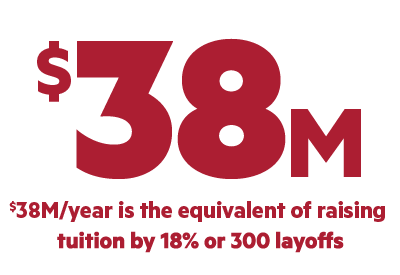Preserving Affordability and Protecting the Student Experience

LMU’s financial strength is the result of decades of disciplined stewardship, all in service of delivering a world-class academic experience and supporting students’ long-term success. We manage expenses within approved budgets, preserve essential cash reserves, and invest strategically in ways that position the university for long-term success. These efforts allow us to limit tuition increases, enhance affordability, and protect the quality of the student experience.
As part of our financial planning, the university has carefully analyzed the cost implications of the union’s economic proposals. The total estimated cost of implementing all current union demands would exceed $38 million annually and $152 million cumulatively through FY 28-29. Further economic proposal cost analysis revealed the proposals would result in a twofold increase in compensation, benefits, and leave for full-time NTT faculty in the bargaining unit, and a fivefold increase for part-time NTT faculty in the bargaining unit.
What would it take to offset $38M?
To offset that cost, LMU would be forced to consider one or more unsustainable options:
- Enrolling hundreds of additional students—a scenario that is neither realistic nor achievable, particularly given national demographic declines creating intense competition for students and campus capacity constraints outlined in the long-range development plan.
- Raising tuition by 18% in a single year, which would immediately make LMU the most expensive university in the country. This increase would place an untenable burden on students and families and undermine our ability to attract and retain a diverse and talented student body.
- Making sweeping budget cuts totaling tens of millions of dollars, which would likely result in the layoff of 300 employees, reduced academic offerings, and service cuts that harm the student experience and long-term viability of the university.
The Full Impact
This analysis includes not only the proposed increases for unionized faculty but also the costs of maintaining parity for non-unionized employees across the university. Moreover, if parity were extended to non-unionized non-tenure-track faculty, the projected cost would rise to approximately $75 million annually. Extending these same terms to all employees would push the total cost beyond $100 million per year.

Prioritizing Students and LMU’s Mission
These costs are not just financially unreasonable—they are fundamentally incompatible with LMU’s mission. LMU exists to serve students - we will not sacrifice students’ access, success or experience to satisfy demands that threaten our mission and our future. Accepting the current proposals would force choices that erode affordability, diminish educational quality, and compromise the university’s ability to serve students effectively. It would jeopardize our long-term stability and undermine the very values that guide our work.
Our goal remains clear: to invest in all employees in a manner that is responsible, mission-aligned, student-centered, and financially sustainable. LMU will continue to make decisions that prioritize students and protect the distinctive experience that defines our university.
Download the complete infographic